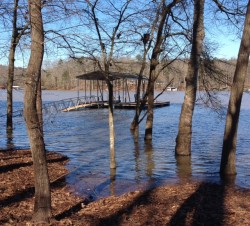Corps of Engineers Reverses Ban on Shoreline Irrigation

In an amazing turnabout, the U.S. Army Corps of Engineers has announced it is reversing its decision to ban irrigation permits for shoreline property owners on Lake Hartwell and Lake Lanier.
“In response to a high volume of stakeholder feedback, as well as input from adjacent landowners in a recent meeting, officials from the Corps’ South Atlantic Division (SAD) have announced suspension of the new policy change prohibiting minor water withdrawals at lakes across the division,” said Corps spokesman Russell Wicke Wednesday in a prepared press release. “The suspension serves to allow further review of the policy and its implications for adjacent shoreline residents.”
The new rule prohibiting use of reservoir water for irrigation was part of an update on shoreline use rules that took effect Jan. 1 for reservoirs within the Corps’ South Atlantic Region.
Late Wednesday, 9th District U.S. Congressman Doug Collins, who lives on Lake Lanier, said he was happy with the Corps’ reversal of their decision.
“I really want to thank the people of Lake Hartwell and Lake Lanier, the associations over there. When they brought this to our attention, we knew this was wrong,” Collins said. “We came out strong against it to start with and Monday night we made our case very passionately that this was something we could not tolerate. The Corps agreed and we came out with something I think is good for the Corps and good for the property owners and land owners that we were able to fight this fight and win.”
Collins was referring to the Lake Hartwell Property Owners Association meeting Monday night in Hartwell that drew hundreds of concerned property owners.
At that meeting, Collins chastised the Corps of Engineers and their reasoning for banning the shoreline irrigation permits after Corps representative Sandy Campbell said the decision was based on the tri-state water wars between Georgia, Alabama and Florida.
“You cannot blame this on the water wars between Georgia, Florida and Alabama,” Collins said Monday night. “If it is, then why didn’t they figure this out 25 ago because that’s when the first (water wars) lawsuit was filed. It took 25 years? Really? And the lawsuits, by the way not solved.”
He said the Corps never contacted any member of Congress to let them know of their decision to ban irrigation, and he questioned why, if Congress made the rules for reservoir uses in the first place, the Corps did not come before Congress to ask for clarification or a change in policy.
“No public hearing, no notification of Congress, no active input,” Collins said. “Maybe it’s because they (Corps of Engineers) didn’t want to realize they were breaking the law for 50 years. Then, with the excuse I got tonight that it’s the tri-state water wars…where has the (Corps) legal department been for the last 25 years?”
Wicke said the policy suspension only applies to the part of the new rule forbidding use of reservoir water for shoreline irrigation.
“As always we welcome questions, and will do our best to answer them during this review. As new details about the results of the review are available, we will share them in future posts,” he concluded.
